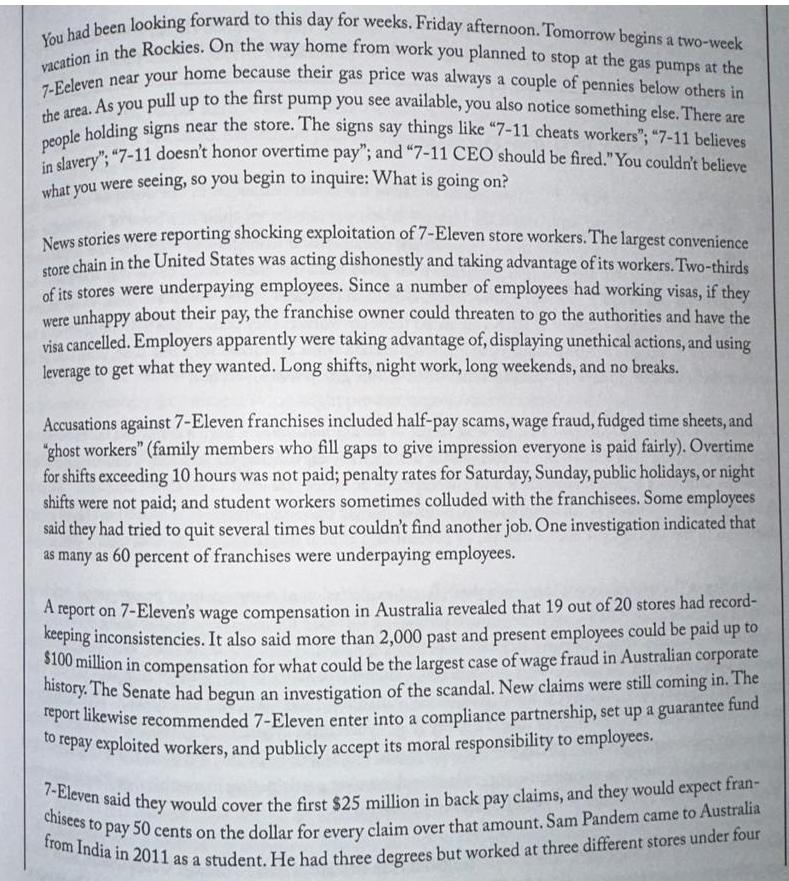Question: Read the case study 7-Eleven above and answer the following questions: 1. Describe the ethical dilemma/concern/issue to be solved 2. What organizational policies and professional


Read the case study 7-Eleven above and answer the following questions:
1. Describe the ethical dilemma/concern/issue to be solved
2. What organizational policies and professional guidelines should be considered? What is the best way for 7-Eleven to approach this dilemma/concern/issue?
3. What kind of responsibility does 7-Eleven have to its different stakeholders?
4. What alternatives are available to 7-Eleven for a solution? What are the advantages and disadvantages of each alternative (if chosen)?
5. Discuss the decision that 7-Eleven should make. What are the short - and long-term consequences of the decision chosen?
You had been looking forward to this day for weeks. Friday afternoon. Tomorrow begins a two-week vacation in the Rockies. On the way home from work you planned to stop at the gas pumps at the home because their gas price was always a couple of pennies below others in 7-Eeleven near your the area. As you pull up to the first pump you see available, you also notice something else. There are people holding signs near the store. The signs say things like "7-11 cheats workers"; "7-11 believes in slavery"; "7-11 doesn't honor overtime pay"; and "7-11 CEO should be fired." You couldn't believe what you were seeing, so you begin to inquire: What is going on? News stories were reporting shocking exploitation of 7-Eleven store workers. The largest convenience store chain in the United States was acting dishonestly and taking advantage of its workers. Two-thirds of its stores were underpaying employees. Since a number of employees had working visas, if they were unhappy about their pay, the franchise owner could threaten to go the authorities and have the visa cancelled. Employers apparently were taking advantage of, displaying unethical actions, and using leverage to get what they wanted. Long shifts, night work, long weekends, and no breaks. Accusations against 7-Eleven franchises included half-pay scams, wage fraud, fudged time sheets, and "ghost workers" (family members who fill gaps to give impression everyone is paid fairly). Overtime for shifts exceeding 10 hours was not paid; penalty rates for Saturday, Sunday, public holidays, or night shifts were not paid; and student workers sometimes colluded with the franchisees. Some employees said they had tried to quit several times but couldn't find another job. One investigation indicated that as many as 60 percent of franchises were underpaying employees. A report on 7-Eleven's wage compensation in Australia revealed that 19 out of 20 stores had record- keeping inconsistencies. It also said more than 2,000 past and present employees could be paid up to $100 million in compensation for what could be the largest case of wage fraud in Australian corporate history. The Senate had begun an investigation of the scandal. New claims were still coming in. The report likewise recommended 7-Eleven enter into a compliance partnership, set up a guarantee fund to repay exploited workers, and publicly accept its moral responsibility to employees. 7-Eleven said they would cover the first $25 million in back pay claims, and they would expect fran- chisees to pay 50 cents on the dollar for every claim over that amount. Sam Pandem came to Australia from India in 2011 as a student. He had three degrees but worked at three different stores under four
Step by Step Solution
3.34 Rating (151 Votes )
There are 3 Steps involved in it
1 The ethical dilemma in this case study is that 7Eleven is exploiting its workers by not paying them fairly and violating labor laws The franchisees ... View full answer

Get step-by-step solutions from verified subject matter experts


